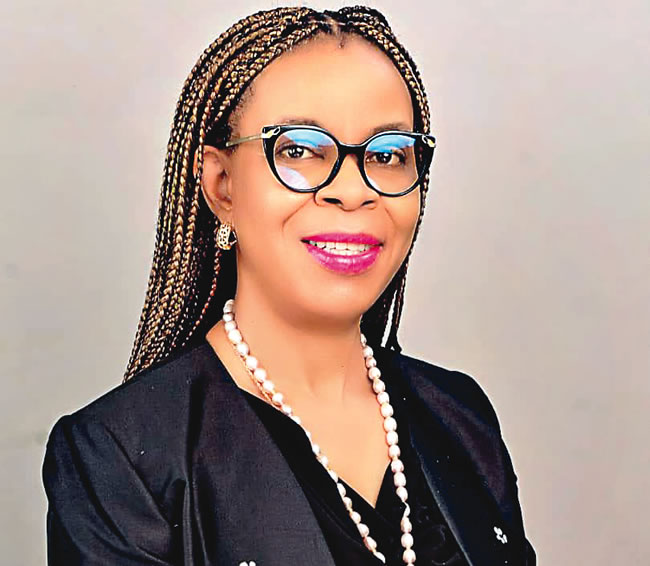Professor Enase Okonedo, a celebrated scholar and seasoned administrator, was recently announced as the incoming vice chancellor of Pan-Atlantic University. The appointment makes her the first female to occupy such position in the institution. In this interview by DANIEL ABEL, she speaks about her academic journey and plans for the institution as she prepares to head its affairs.
Being a female vice chancellor is no small feat; how has the journey been so far?
My gender has never shaped my growth. I see myself as a professional before considering myself as a female. My professional journey has been great because I have been fortunate to have worked with an institution in which there is no disparity between male and female. I haven’t experienced the challenges that most female folk face elsewhere. But of course my journey to vice chancellorship was also great. The academia is my second career. I started my career in banking before joining Lagos Business School as research assistant which was the very beginning of my journey into academics. Lagos Business School which is the origin of Pan-Atlantic University at that time was not yet a university, and the recruitment philosophy at that time was to recruit people from the industry. I was recruited because I had several years of banking experience; I was a chartered accountant with more than enough industry experience which was what the institution needed. Over the years, I served in many key roles in the institution, including Head of the Finance Department, MBA Director, Director of Faculty, Deputy Vice-Chancellor, among others.
You are set to resume as the vice chancellor January 1, what are your plans for the institution?
I am fortunate to be resuming at a time when there would not be any radical change because the institution has been working on a seven-year strategic plan which comes to an end at the end of this year. I completely align with the plans and strategic map of my predecessors and intend to continue in the path. The groundwork has already been laid for us to go on to do the things that the university needs to. The institution has put in place another strategic plan that will begin January 1. Over the next five years, the five key areas we intend to focus on are teaching, learning, research, infrastructure, people and culture, and community engagement. In terms of teaching and learning, our focus is on how to develop graduate students who are ready for the industry. We would develop graduates that are ready to compete in the workforce in terms of knowledge, skills and attitude. Of course as a young university, our research history is different from older universities. However, we have articulated an agenda that will look into researches that are impactful and have major effects on policy and practice. We need people who have the proper mindset and have cultivated the habit of contributing to nation-building. Another pillar in our agenda is community engagement. Furthermore, the institution is looking for ways to better its host community.
Pan-Atlantic University was founded in 2002; how would you rate the impact of your institution since its inception on the country’s educational development?
While the university was founded in 2002, it is important to know that we have been in existence as a business school. In terms of business and management education, the university has actually contributed to developing practical managers with a lot of emphasis on leadership and business ethics which is vital globally. One of the largest impacts we have made is in the area of developing ethical leadership in the country. If we take a look at the profile of a lot of managers in corporate Nigeria, we’ll see that most pass through the university. Our undergraduate programmes over the last few years have developed students that have performed outstandingly in their various courses. So in terms of what we offer, we have four schools in the university now and we have a unit which is called the Enterprise Development Centre, which is very impactful in terms of developing small scale entrepreneurs. This skill building has the capacity to develop small enterprise, which can propel growth of any economy. So far they have the right skill and proper environment they can go on to be job creators and aid the development of the country. And lastly the School of Media and Communication has played a major role in the field of journalism.
What are some of the challenges confronting the institution and how do you intend to address them?
We do have challenges and some of them are not under our control. For instance the location of the university is in Ibeju Lekki. This is an area of recent development and cannot be compared to other areas of Lagos in terms of infrastructure. Also, road network in getting to the institution is another challenge. However, I’m happy to say that the state government in collaboration with some private entities are already working on this issue and doing something concerning the road construction. Another challenge due to the location is connectivity which is an important issue these days. We rely on technology a lot, not only for communication but also for educational purposes. Another issue which I’m not sure is actually a challenge is the pace at which we are growing. We are deliberate at the pace we choose to grow and the amount of courses we choose to offer so as to provide premium service to our students. However, the main challenge the institution is currently battling is the limited infrastructure in this area of the state.
How would you rate Nigeria’s educational development when compared to global standards?
While it would be hard for me to place Nigeria at a certain place in terms of global educational standards, I would like to note that there have been improvements in a lot of areas. I think that what we need to currently look at is the quality of what we are offering and how we compare with other countries of the world. The ability to offer quality education, however, depends on the available funding for education. We need to take a look at what percentage of the national budget is spent on education in Nigeria, compared to the 15 per cent standard set by UNICEF. Over the past decade, we have seen that allocation to education has decreased. The percentage of the federal budget has dropped remarkably and this year recorded the lowest since 2011 at 5.6 per cent. This invariably affects the quality of education delivered. Second is the national policy of education and how in tune it is with the current reality of things to provide students with contemporary skills that employers are looking for. There is disparity in this situation and only when this is addressed, will Nigerian youths be on the path to standing at par with other institutions internationally.
It’s been said that Nigeria is one of the countries with the lowest investment in research and development, even in Africa. What do you think are the implications of this generally on the nation, and its people?
I believe that if we are not investing in research and development, our economic and social development will be hindered. It means that if we are not investing in research and development, we’ll continue to rely on innovations from other countries, innovations that particularly are not suited or do not work for us. Research and development provide homegrown solutions to our problems. The implication of low investment in research and development is that we are stifling our growth as a nation, and increased investment in research and development will ensure we are not limited in our bid to grow. We need to place more priority on research to ensure we grow more than we currently are.
The population of university admission seekers is increasing every year, yet the number of spaces available in the existing institutions can barely accommodate half the number of applicants. Private universities like yours make very little difference by way of absorbing these ever-increasing admission seekers because of the cost. What is the way out?
Pan-Atlantic University can only admit about 400 students yearly and when we look at the amount of admission seekers annually, you see the numbers are always increasing. However, Pan-Atlantic University is focused on providing top-notch service for its students which necessitated us to only admitting within our capacity. Unlike what happens in many public universities, we try to manage admitting only the number of students we can cater to. We are less focused on the numbers we admit but more concerned about providing quality education to the few that meet our criteria.
There have been calls for universities to be allowed to solely admit their own students. Looking at it dispassionately and without attempting to sound politically correct, do you believe the central admission system is helping anyone other than the government?
Without any form of bias, I believe UTME/JAMB is quite essential because it serves as the first filter which is essential. It enables some sort of standardisation which makes sure people who are qualified to proceed to higher institution do so. It ensures every student meets a minimum benchmark before proceeding university.
WATCH TOP VIDEOS FROM NIGERIAN TRIBUNE TV
- Let’s Talk About SELF-AWARENESS
- Is Your Confidence Mistaken for Pride? Let’s talk about it
- Is Etiquette About Perfection…Or Just Not Being Rude?
- Top Psychologist Reveal 3 Signs You’re Struggling With Imposter Syndrome
- Do You Pick Up Work-Related Calls at Midnight or Never? Let’s Talk About Boundaries







